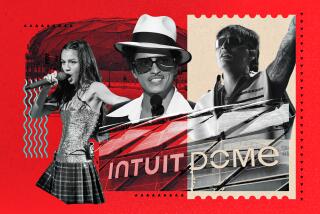Slaying the Giant : Microsoft Dominates the Vast Market for Computer Software. But by Knowing What Consumers Want, Two Bay Area Firms in Important Niches Are : Intuit Aims to Quicken the Pace of Automation
- Share via
MENLO PARK — In the software business, fear and loathing of Microsoft Corp. is the order of the day.
Proprietor of the crucial DOS and Windows operating software, Microsoft is too big, too strong, too ruthless for anybody’s good, critics say. Bill Gates and company, they prophesy, soon will wipe out competition in one of the world’s fastest-growing and most influential industries.
Yet even Microsoft has its weaknesses, and nowhere are they more evident than in the burgeoning consumer software market. When business customers are looking for word processors or spreadsheets or database programs, they increasingly turn to Microsoft. But when they are looking for computer games or educational programs or personal finance packages, they turn elsewhere.
It is not for lack of effort on Microsoft’s part. Powerful consumer software is a key element of Gates’ ambitious long-term vision, which he has dubbed “information at your fingertips.” Plummeting PC prices, moreover, are rapidly increasing the number of PCs in the home, making consumer software the biggest growth segment in the industry.
But a handful of nervy and capable upstarts have shown that they understand consumer software far better than the Redmond, Wash.-based behemoth. Two Bay Area companies in particular--Broderbund Software of Novato and Intuit Inc. of Menlo Park--have demonstrated that it’s possible to take on the giant and prosper.
Both are small companies. Both recently went public. Both are consistent innovators who understand customer service far better than most software firms. And though both live in fear of Microsoft, they’re rarely heard to complain.
Scott Cook, co-founder and chief executive of Intuit Inc., hardly ever talks about bits and bytes and bandwidth. He doesn’t consider technical brilliance all that important. He doesn’t even view his company, purveyor of Quicken--one of the biggest-selling software products of all time--as a software company.
He thinks it is more like his one-time employer, Procter & Gamble.
“In a consumer-driven company, the ‘R’ in R&D; is lots of customer research,” says Cook, a buoyant, personable 40-year-old who carries none of the pretensions of a computer industry mogul. “In order to meet the needs of customers, you have to be very good technically. . .but you get to the technology through up-close-and-personal contact with the consumer.”
Procter & Gamble saw that people wanted super-absorbent paper for paper towels and toilet tissue, Cook says, so the company invented a new paper-making process. Intuit understood that people wanted to automate their finances without changing their habits, so it invented a whole new type of personal finance software.
The results have been spectacular.
Quicken holds more than 70% of the personal finance software market. A new accounting program, called Quickbooks, has seized 60% of that market in a mere two years. A public stock offering in March valued the company at $220 million.
And all this has been accomplished in the face of repeated frontal assaults from Microsoft.
Despite a massive promotional effort and loss-leader pricing, Microsoft Money has barely made a dent in Quicken’s franchise. Another large and determined challenger, Computer Associates, has gone so far as to offer its software free in an effort to pry customers away from Quicken.
“Intuit has done a really fine job establishing the category. They have huge name recognition,” allowed Charlotte Guyman, director of marketing for Microsoft’s consumer division. “We’re realistic about how long it takes (to gain a foothold), but we’re definitely committed.”
She acknowledges that Microsoft will have to be more Intuit-like if it is to compete successfully in consumer markets. “It’s a different design process for us. It requires much greater dialogue upfront with our customers. . .It’s a challenge for us to sell low-price-point products.”
Indeed, Microsoft turned to another company, Great Plains Software, to find an accounting program that could compete with Quickbooks.
Exactly why Microsoft would bother targeting Intuit is not immediately obvious. Quicken, after all, sells for around $30, compared with at least $100 for most business software packages. The market for PC finance software is worth only a few hundred million dollars annually--small potatoes for a $3.7-billion (revenue) company like Microsoft.
But Intuit has created a business that goes far beyond the sale of shrink-wrapped software packages. In the classic tradition of razors and razor blades, about one-third of the company’s revenues--and probably even more of its profits--come from selling paper checks and other supplies that are used with the software.
And Cook has even bigger ambitions.
Intuit, he says, is in the business of automating financial transactions, not selling software. Through agreements with banks, Quicken software works hand-in-glove with a variety of home banking services. A recent deal with Visa makes it possible to track and pay credit card bills electronically.
Intuit also is moving aggressively to develop software and services for new “personal communicator” devices. While the speed at which society will move away from paper checks and currency toward electronic payment systems may be in doubt, the trend is clear enough. Intuit figures if it can keep its customers happy, it has a guaranteed seat on this growth train.
Keeping customers happy, of course, is easier said than done. “Everybody talks about customer service,” says Richard Shaffer, principal of the New York consulting firm Technologic Partners. “Intuit has a reputation of actually providing it.”
How does the company do it?
There are lots of specific efforts, including so-called “follow-me-home” research. Intuit calls retailers to get the names of customers, then goes to their houses to watch how they are actually using the product. There are continual customer surveys and focus groups and a well-manned telephone service operation to provide free support--and gain yet more information on what customers really want in the product.
Cook is fanatical about research. Good data are the cornerstones of his management philosophy, which stresses the need to make decisions based on information, not on rank. He sketches an organizational structure in which the senior executives are not at the top of a pyramid, but rather at the center of a circle.
“In most businesses, decisions are based on judgments, and when decisions are based on judgments, the highest-paid judgment wins,” says Cook. “In a truly consumer-driven company, decisions are based on data, so the person with the best data wins.”
A circular organization is vital, he says, because “the people with the best view are those at the periphery; those people are close to where the data is.”
As Intuit gets bigger, of course, organizational issues become even more important. In March, Cook closed the company for a day so that all employees could attend a kind of brainstorming session at the San Jose convention center designed to help develop a consensus about where the company was heading.
Cook’s real ambition, in fact, doesn’t necessarily involve software, or even the broader notion of automating financial transactions. “Truly great companies are not great because of a single idea.” he says. “They’re great because of a culture that was built that allows people to do great things.”
Cook excoriates American businesses for too often creating an environment in which “the thinking part is robbed from the worker by someone who sits in an ivory tower. No wonder people get cynical and give up.”
Interestingly, his criticisms do not extend to Microsoft, which is routinely vilified by many in the software industry--and has been under investigation by the Federal Trade Commission--for allegedly abusing its power.
“We’ve seen nothing in our dealings with them where they have taken unfair advantage. They’ve been very ethical,” Cook says. “A mountain is being made of something that isn’t even a molehill. The people who complain are a bunch of whiners.”
Still, Cook isn’t interested in building another Microsoft in Menlo Park. His model remains Procter & Gamble. “They’ve been great for 100 years,” he says. That’s the legacy--to develop a way of working that enables people to create the great inventions.”
Intuit At-A-Glance
Chairman and CEO: Scott Cook
Headquarters: Menlo Park, Ca.
Employees: 600
Source: Company reports
More to Read
Inside the business of entertainment
The Wide Shot brings you news, analysis and insights on everything from streaming wars to production — and what it all means for the future.
You may occasionally receive promotional content from the Los Angeles Times.










